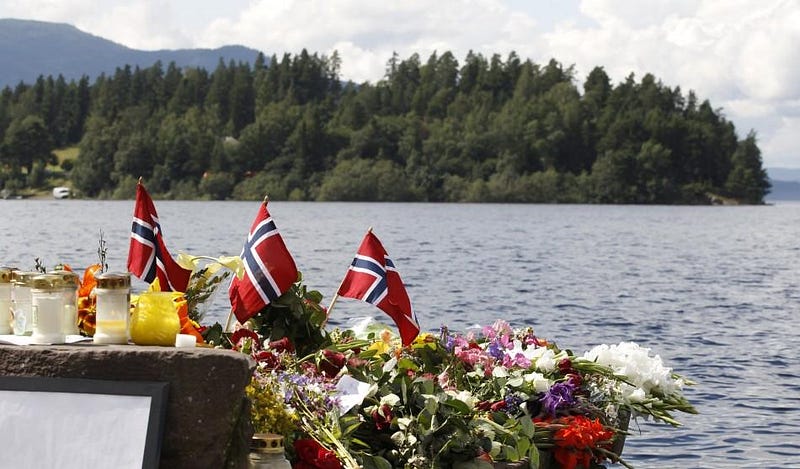A Decade On: How Oslo Ignited the Global White Supremacist Movement
By: Leela Cullity, MPAC Policy Intern

On the 10-year anniversary of the Oslo attack, the Forums at MPAC hosted a special conversation, titled “Oslo: The Tipping Point of Global White Nationalism”, with three leading experts, each working to combat the rising threat of global white supremacy: Dr. Torkel Brekke, Dr. Sindre Bangstad, and Daryl Johnson. The July 22nd, 2011 terrorist attack in Oslo carried out by white nationalist Anders Breivik led to a decade of widespread global white supremacist violence. The forum focused on the implications of Brievik’s violence on the global nature of white supremacy, the history of counterterrorism policy in the United States and Norway over the last decade, and each government’s ability to mitigate this growing threat. MPAC Policy Analyst Prema Rahman and MPAC Policy Intern Leela Cullity moderated the forum and asked each panelist to describe their work since the attack and what can be done now.
Dr. Brekke, a research theme leader at the Center for Research on Extremism (C-REX), described the comprehensive research that has been done in Norway since the attack. First, it was evident that the police and national security forces were not prepared to handle the attack on the 22nd. He elaborated, “The police handling of the situation was faulty… the commission explained that the attack on the government complex was faulty.” Dr. Brekke noted the three major attitudes on what can be done in Norway following the attack. The prevailing narrative in Norway following the attacks is the “Democracy” narrative, which contends that right-wing extremism is not the root cause of these attacks but instead that Norwegian democracy is under attack and that the solution is to repair democratic institutions. This narrative is familiar in the United States, where right-wing extremism is often not identified as the root cause of racially motivated attacks. Similarly, Dr. Brekke discussed the harms of labeling white supremacists as “lone wolf” actors when in fact, these attacks are interconnected and often modeled off of one another. As Dr. Brekke noted, “The people who embraced or admire Breivik (Oslo attacker) are to be found on anonymous channel boards. They are more numerous in Russia and the U.S., compared to Western Europe which can be explained by the taboo of violence in Westen Europe.”
Dr. Bangstad, author of Anders Breivik and the Rise of Islamophobia, echoed many of Dr. Brekke’s remarks by discussing what action youth activists have taken since the attacks as well as the necessary prioritization of white supremacy as a global national security threat. Several reports, such as the one Dr. Brekke referenced, discuss the traumatizing impacts on survivors of that attack and the long-term harms the attack will have on that generation of individuals attacked in 2011. Dr. Bangstad notes their resilience through advocacy by remarking, “Survivors have taken the lead which has exposed them to hate messages and death threats as accounts to them speaking in public.” Considering the continued fear survivors are placed under, Bangstad emphasized that white supremacist violence requires a higher level of prioritization within the Norwegian government, emphasizing, “Norway has never experienced any terrorist attacks perpetrated by Muslims. All terrorist attacks in modern Norwegian history have been perpetrated by right-wing extremists.” He also noted that “Norway, much like the U.S., has underplayed right-wing extremists, which is something they have come to regret.” The conversation then shifted to how the U.S., like Norway, has not delivered an adequate response to the rising threat of white supremacist violence.
Daryl Johnson, a foremost expert on domestic terrorism in the United States and a former analyst at the Department of Homeland Security, discussed the lack of proper response during the January 9th attack on Capitol Hill. He states, “We see the exact same thing [as the Oslo attacks] when the Capitol attack happened — we see intelligence wasn’t prepared. There was also a tactical component where we saw the threat underestimated.” Johnson noted that within U.S. legislation, there has been a major gap in prosecuting terrorism motivated by white supremacy. He also advocated for the passage of the Domestic Terrorism Prevention Act of 2021, which would expand the availability of information on domestic terrorism, as well as the relationship between domestic terrorism and hate crimes.
Each panelist offered incredible insight on the issue of global white supremacist violence. MPAC greatly appreciates the time and expertise each panelist offered this Thursday. In our latest policy report, The Double Standards of U.S. FTO vs. DTO Prosecution, we identify the glaring discrepancies in how the United States prosecutes acts of terrorism carried out by those of (American) Muslim or Black and Brown origin and how it prosecutes terrorist plots enacted by white supremacists. White supremacy is clearly global in nature, yet, our counterterrorism policies fail to recognize it as foreign terrorism. Moving forward, we urge the U.S. government to address the clear and persistent terrorist threat of white supremacy and to prosecute these actors with an equitable definition of terrorism that designates all violent extremist groups as terrorists, regardless of race, color, or creed.
If you missed the forum, you can still watch the full session here.